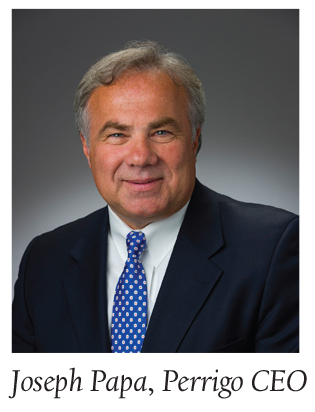Astellas Hails Marriage Equality
The historical June 26 SCOTUS Ruling establishing gay marriage as a right in all 50 states surprised and delighted many. Astellas Pharmaceuticals—the only pharmaceutical company to do so—quickly raised the Rainbow Flag, the symbol of Gay Pride and the struggle for equal rights that began with Greenwich Village’s Stonewall Inn riots in 1967, outside their corporate office in Chicago. The company also joined in the celebration on their Facebook, Twitter and YouTube sites, displaying their logo backed by the colors of the Pride flag.
For the sixth consecutive year, hundreds of the company’s LGBTQ employees and their families also walked, dressed in corporate diversity T-shirts—in Chicago’s Pride Parade—the city’s 46th annual event—or rode aboard the Astellas’ corporate float. The Human Rights Campaign also recently awarded the company with a perfect Corporate Equality Index, a national benchmarking tool that rates companies on policies and practices concerning lesbian, gay, bisexual and transgender employee quality.
Teva Takes Hit—Copaxone Patent Invalid
The U.S. Court of Appeals recently upheld a ruling rendering Teva’s ‘808 patent for Copaxone—valued at about half of the company’s revenue—as invalid on June 18 according to the WSJ. The ruling opened the door for Novartis’ Sandoz unit’s U.S. launch of a once-daily generic 20 mg version of the drug, Glatopa, developed in a collaboration with Momenta Pharmaceuticals and approved by the FDA in April 2015.
Mylan, after recently rejecting a more than $40 billion takeover bid from Teva, is also developing a 20 mg once-daily generic version of the drug currently under renewed review by the FDA. In a move thought to protect its bottom line, Teva has already switched 70% of its Copaxone 20 mg patients to a new, lower-cost 40 mg injection—which requires administration only three times a week.
Allergan Seeks Kythera Buyout
Three months after its acquisition of the anti-wrinkle treatment, Botox, Actavis officially changed its name to Allergan—but the company’s change doesn’t stop there. Allergan is seeking a $2.1 purchase of Kythera Biopharmaceuticals to acquire its injectable drug, Kybella, and expand its cosmetic treatments product line, according to Reuters. Used to reduce the fat present in “double chins”—a common source of complaint among many Americans—the drug received the FDA approval in April. The drug has been pitched as a non-surgical alternative to removing fat from this area, and is expected to reach peak sales of approximately $300 million.
Abbott Backs Mylan to Buy Perrigo
After making two unsuccessful offers to acquire Perrigo, Mylan’s largest stakeholder, Abbott, plans to vote in favor of Mylan’s new $30 billion bid for Perrigo. The EpiPen is Mylan’s main source of revenue and although Perrigo’s products address a different market—generic OTC cough-and-cold remedies—both companies are on a financially even playing field, according to WSJ. Perrigo, however, could use this development, says WSJ, to attempt to attract higher bids from other companies. According to Perrigo CEO, Joseph Papa, the company is open to negotiation, but he said in a statement that the companies are “pretty far apart” as the offer currently stands.
Google X Creates New Health Wristband
No stranger to innovation, Google’s life sciences group is developing a health-tracking wristband to track wearer’s vital statistic. The technology carries sensors that continually measure vital signs such as heart rhythm, pulse and skin temperature. In addition to vitals, the band will also measure environmental information such as light exposure and noise. Although the wristband seems like it would be the perfect addition to the world of personal smart devices, it will most likely not be seen in consumer markets.
The head of Google X research division, Andy Cohen, said in a statement, “Our intended use is for this to become a medical device that’s prescribed to patients or used for clinical trials.” According to the Google team, the health-tracking wristband would be used to monitor patients following heart attacks so that they may track patients’ cardiac signals. The wristband can also monitor the vital signs of those who suffer from Parkinson’s disease. Clinical trials for the wristband are said to begin over the summer.
Privacy/Security Obstructs Mobile Health
Patient privacy and security are possible reasons keeping HCPs from adopting mobile health options, according to a recent Journal of the American Medical Informatics Association report. The association reviewed studies noting HCPs’ thoughts and feelings towards mobile health apps and other technologies. Many, the review found, were afraid to transfer information across digital mediums, not wanting to risk the confidentiality of data. Along with privacy concerns, many physicians don’t feel the devices could be particularly useful or easy to use. The security risk is apparently a more pressing concern than cost, technical issues, or time needed to familiarize with the technology. This could keep a majority of healthcare providers from adopting efficient, useful healthcare devices for their patient’s use.
Bristol-Myers Squibb Expands R&D
In a continuing effort to evolve the company’s R&D organization, Bristol-Myers Squibb plans to expand its presence “within hubs of scientific excellence and innovation” by opening a new state-of-the-art research site in Cambridge, Massachusetts. The new facility is expected to open in 2018, and is being built in addition to the 61,000-square-foot expansion of its R&D Discovery site in the San Francisco Bay Area. Executive Vice President and CSO, Francis Cuss, MB BChir, FRCP said in a statement that these locations “position the company and our scientists in the heart of vibrant ecosystems of world class science, innovation and business opportunities, which offer ideal environments for fostering external collaboration.”
The evolution of Bristol-Myers Squibb is consistent with the company’s R&D organization strategic focus, which also prompted the pharmaceutical manufacturer to announce its plans to suspend any new discovery research efforts in the area of virology, a move that will neither impact ongoing clinical development programs, nor marketed virology products, according to a statement provided by the company. Bristol-Myers Squibb plans to focus their research on genetically defined diseases, molecular study technologies and discovery platform chemistry at the new Cambridge location.





